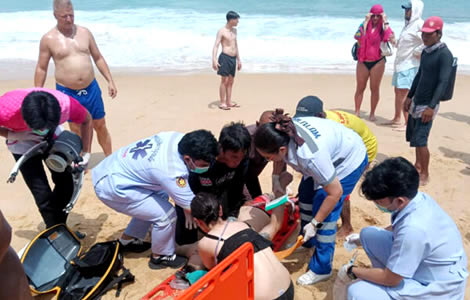Third tourist drowns at Phuket’s Karon Beach in just 18 days amid deadly rip currents. Despite clear red-flag warnings, swimmers ignored the danger and drowned. Authorities plead with tourists: respect red flags or risk losing your life in these treacherous waters.
Another tourist has died at Karon Beach — the third in just 18 days. On Saturday, a Japanese man drowned while swimming in red-flag conditions. His wife watched in horror as he slipped under the waves. She later refused an autopsy. Her husband had come for a holiday. He left in a body bag. Before that, on June 20th, a 38-year-old Russian man drowned while swimming with his wife and son. Just ten days earlier, an Albanian man was rescued from the same beach. His 43-year-old Egyptian wife wasn’t so lucky. He refused to accept she had died — even after her body washed ashore. The cause? Brutal rip currents — especially strong from May to October.

They don’t care where you’re from. They don’t care how strong a swimmer you are. Once they take hold, there may be no second chance. Authorities in Phuket are now pleading with tourists: red flags mean danger. Don’t ignore them. Don’t gamble with the sea. Because this isn’t just a beach. When the red flags are up, it’s an aquatic battleground. And for three families this month, the cost was everything.
A third tourist has drowned at Phuket’s Karon Beach in less than three weeks. This time, it was a 34-year-old Japanese man, identified only as Hikaru. He had just arrived in Thailand with his wife for a short holiday. The couple planned to relax and enjoy the coast. But within 24 hours, their dream getaway ended in tragedy.
On Saturday morning, June 28, Hikaru and his 33-year-old wife went for a swim. Although red flags were clearly posted, warning of dangerous conditions, they entered the water. Red flags mean do not swim, but many tourists underestimate their importance.
Rough sea and rip currents pull swimmer under while wife watches helplessly despite warnings posted clearly
According to police, the sea was rough that morning. Karon Beach is infamous for rip currents, especially during monsoon season. These currents are swift and deadly. Once caught, even skilled swimmers struggle to escape.
Suddenly, Hikaru was pulled under. His wife saw it happen. She screamed for help. Other beachgoers rushed to assist. Lifeguards, already nearby, quickly responded. CPR was performed on the sand. Despite their best efforts, Hikaru could not be revived. He was pronounced dead at the scene.
Emergency responders transferred his body to Patong Hospital. There, doctors confirmed the cause of death: drowning. His wife, heartbroken and in shock, declined an autopsy. She told police she had seen everything and was certain about what had happened.
This death marks the third tourist drowning at Karon Beach this June alone. Each case followed a similar pattern. All three victims entered the water despite clear red-flag warnings. Tragically, all three ignored the danger.
Russian tourist drowns at Karon Beach despite red flags as son watches in horror during family vacation
On June 20, just eight days earlier, a 48-year-old Russian man also drowned. His name was Nikita Tretyakov. He had arrived with his wife and 20-year-old son. The family checked into The Beach High Hotel and planned a relaxing stay.
That morning, Nikita and his son went to swim. Like the Japanese couple, they too saw red flags. Nevertheless, they entered the surf. The sea appeared manageable at first. The two played in the water, unaware of the rip current forming nearby.
Suddenly, Nikita vanished beneath the waves. His son cried out. Lifeguards immediately sprang into action. Within minutes, they found his body 100 meters from shore. They performed CPR but could not save him.
His family watched helplessly as emergency crews tried to resuscitate him. When the ambulance arrived, they begged for his body to be taken to the hospital. Medical staff confirmed there was nothing more they could do. He had died at sea.
Albanian woman drowns minutes after entering water while husband watches helplessly and calls for lifeguards
The first drowning this month occurred on June 10. The victim was a 41-year-old Albanian woman named Daniela Idrizi. She had just arrived in Phuket with her husband, Mohammed Abdulkhaliya Hamdi Alsaba, an Egyptian national. They were on a brief vacation.
They checked into their hotel and soon headed for the beach. Within minutes of entering the water, Daniela disappeared. Her husband searched frantically. Eventually, he alerted lifeguards.
The rescue operation took nearly an hour. When Daniela was found, she was unconscious and unresponsive. Emergency teams rushed her to Chalong Hospital. Tragically, she was declared dead shortly after arrival.
Her husband was devastated. He stayed beside her and refused to leave. Police believe rip currents were responsible in her case as well. However, it remains unclear whether warning flags were visible that day.
Together, these three deaths paint a grim picture. All occurred within 18 days. It all happened at Karon Beach. And in each case, the sea claimed a life despite warnings.
Karon Beach is a top tourist spot but its tides and monsoon winds create rip currents from May to October
Phuket is a top tourist destination, known for its beaches. But Karon Beach, though beautiful, is dangerous. It is one of the island’s most perilous swimming spots. Its shape, tides, and currents create hazardous conditions—especially during the rainy season.
Thailand’s southwest monsoon lasts from May to October. During this time, the Andaman Sea becomes unpredictable. Strong winds and waves create hidden rip currents. These narrow channels of fast-moving water drag swimmers out to sea.
Often, swimmers panic and try to swim straight back. That’s a fatal mistake. Experts say swimmers should float and swim parallel to shore. This technique allows them to escape the current.
However, most tourists are unaware. They come from countries without strong coastal education. They do not recognize red flags. Or worse, they believe the warnings do not apply to them.
This overconfidence often leads to tragedy. Some swimmers assume they are strong enough. Others think the water looks calm and safe. Yet, rip currents can form beneath deceptively smooth surfaces.
Rip currents at Karon Beach can reach speeds faster than Olympic swimmers making escape nearly impossible
In fact, these currents can move at 2.5 meters per second. That’s faster than Olympic swimmers. Without training, it’s nearly impossible to outswim them.
Local officials stress the importance of beach safety. Lifeguards place red flags along unsafe areas. They patrol beaches daily. When the water is safe, red-and-yellow flags mark swimming zones.
However, enforcement is difficult. Tourists may disregard warnings. Others may not see the flags at all. Therefore, education and signage play a crucial role.
Lieutenant Colonel Charas Lempan of Karon Police confirmed that red flags were posted in the Russian and Japanese cases. He noted that in both situations, the sea was visibly rough. Large waves and strong winds made swimming extremely risky.
Even so, the victims entered the water. Sadly, they paid the ultimate price.
The lifeguards involved in these rescues acted quickly. In each case, they performed CPR immediately. They used rescue buoys and scanned the water for victims. But once a swimmer is pulled far out, the chances of survival decrease rapidly.
Lifeguards perform CPR and rescue attempts but once pulled far from shore, chances of survival drop sharply
Medical responders said CPR was administered for several minutes in both the Russian and Japanese cases. Yet, both men were declared dead at the beach. Their bodies were later sent for autopsy or embassy processing.
In Hikaru’s case, his wife declined an autopsy. She insisted she saw him drown and understood what had happened. Thai authorities have contacted the Japanese Embassy. Arrangements are underway to return his body to Japan.
In Tretyakov’s case, his wife Natalia and son were inconsolable. He disappeared while swimming with his son. The body was recovered quickly, but the trauma of watching the rescue fail left the family shattered.
In Daniela Idrizi’s drowning, her husband was the only witness. He stayed by her side through every moment of the search and at the hospital. His grief was visible and overwhelming.
Authorities increase patrols and update signage to warn tourists as drownings continue at Karon Beach
Given these recent tragedies, local authorities are taking action. More lifeguards are being deployed. Patrol frequency is increasing. Signage will be updated and translated into multiple languages. Hotels are also being urged to remind guests of beach hazards.
Authorities emphasize that red flags are not suggestions. They signal real danger. When red flags fly, the sea should be avoided—no exceptions.
Additionally, tourists are advised never to swim alone. Swimming near lifeguard stations is strongly encouraged. If caught in a rip current, remain calm. Don’t fight the water. Instead, float and swim sideways to break free.
Rescue teams also warn against attempting to save others without training. Many drown while trying to help someone else. Instead, call for lifeguards and, if possible, throw a flotation device.
Despite increased awareness campaigns, fatalities continue. On average, over 30 people drown annually at Phuket’s beaches. Most are international tourists. Many die simply because they underestimated the power of the sea.
Phuket’s unique geography adds to the risk. The island’s shoreline and wind patterns during monsoon season create ideal rip current conditions. Waves crash unevenly, carving fast-moving channels beneath the surface.
Rip currents form suddenly near shore, pulling unaware tourists into dangerous fast-moving water
These channels are not always visible. They can form suddenly. Tourists may believe the sea is calm. But just meters from shore, they can be pulled into deep, fast water.
Despite warnings, despite red flags, despite lifeguards—people still die.
Officials hope that by highlighting these tragic cases, future incidents can be prevented. Every drowning is a painful reminder that nature demands respect.
Karon Beach is stunning. Its golden sands and turquoise waters attract thousands. But beauty can be deceptive. The sea may appear welcoming—but it is not always safe.
48-year-old Russian tourist drowns swimming off Karon Beach with red flags raised warning of danger
Egyptian tourist’s harrowing ordeal after losing his wife on Karon Beach on Tuesday hours after arrival
Visitors must be vigilant. Respect local warnings. Follow lifeguard advice. Understand the risks. The ocean is powerful and, at times, unforgiving.
Ultimately, safety begins with awareness. For every tourist who ignores a red flag, there is a chance they won’t return home. Three families now face that devastating truth.
Let these tragedies serve as a clear warning: Red means danger. Red means don’t swim. Red can mean the difference between life and death.
Stay safe. Be alert. Enjoy the beach—but respect the sea.
Join the Thai News forum, follow Thai Examiner on Facebook here
Receive all our stories as they come out on Telegram here
Follow Thai Examiner here
Further reading:
48-year-old Russian tourist drowns swimming off Karon Beach with red flags raised warning of danger
Loony pot-smoking German who terrorises dentist clinics on the run in Nakhon Ratchasima. Arrested
29-year-old Indian tourist jumped to his death in Bangkok’s Sukhumvit area. Cannabis found in room


















